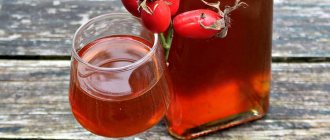Rosehip syrup: beneficial and medicinal properties
1. Eliminates inflammatory processes in the body and is used in the treatment of both acute and chronic diseases.
2. Helps quickly restore strength after physical activity and reduces chronic fatigue syndrome.
3. Prevents emotional and nervous exhaustion of the body, increases a person’s mental abilities.
4. Helps relieve symptoms of intoxication in case of poisoning, for example, with alcohol or spoiled foods.
5. It has a strengthening effect on the body as a whole and promotes rapid restoration of the functioning of all organs.
6. Increases hemoglobin and strengthens the walls of blood vessels.
7. Has a weak diuretic and choleretic effect.
8. Helps stabilize blood pressure.
9. It has an antioxidant effect and prevents premature aging of the body.
Application
Medicinal properties of rosehip fruits, petals and roots
We call rose hips the fruits of wild roses, which are valued for their medicinal properties. Not only the fruits, but also the petals and roots of the plant have benefits.
Rose hips contain many useful substances that perform their functions in the body:
- Vitamin C has an antioxidant effect, which means it neutralizes free radicals that are formed during infection and lead to the destruction of healthy cells. Also, the biologically active substance stimulates the production of interferons - substances that destroy foreign viruses.
- Vitamin P slows down the development of infection and reduces inflammation, which occurs by reducing the permeability of small vessels.
- Vitamin PP dilates small blood vessels, improves blood flow to the skin and mucous membranes and increases metabolism, effectively removing toxins from the source of infection.
- B vitamins affect blood vessels, immunity, and the nervous system.
- Vitamin E, like ascorbic acid, is able to neutralize the effects of free radicals.
- Tannins, which act as antiseptics and anti-inflammatory compounds.
- Potassium, magnesium, calcium, iron, zinc, selenium are microelements, without which no system functions.
Rose hips perform the following functions:
- Restore and stimulate the immune system.
- Stops the growth and reproduction of bacteria.
- Eliminate viruses.
The petals of the plant help with the following:
- Regenerate the mucous membranes of the respiratory tract.
- Eliminate free radicals.
- Replenish vitamin C reserves.
Rosehip root has the following effects:
- Painkiller.
- Disinfectant for the mucous membranes of the oropharynx.
- Antispasmodic.
The plant helps in the treatment of flu, respiratory infections, sore throat, cough. In alternative medicine, decoction, infusion, and essential oil are used.
Important! It should be remembered that the plant can cause an allergic reaction, so rose hips should be given with caution.
Rosehip syrup: indications for use
1. In case of food or alcohol poisoning, to restore the body and water-salt balance.
2. For vitamin deficiency and chronic fatigue.
3. For the treatment and prevention of colds and flu in adults and children, especially during the cold autumn-winter period.
4. In the treatment of tropical ulcers, long-term non-healing wounds, bedsores, dislocations and fractures.
5. In the treatment of inflammatory diseases of the intestines, liver and gallbladder. It helps well in the treatment of pancreatitis, sinusitis, gastritis, cholecystitis.
6. To restore the body after a serious illness and after surgery.
7. During chemotherapy courses.
8. With a dry and hysterical cough it will soften irritation of the mucous membrane, and with a wet cough it will help remove sputum.
9. Helps the intestines cope with constipation.
10. Rose hips enrich the syrup with iron, magnesium and calcium, which makes it a good remedy for treating anemia and increasing hemoglobin in the blood.
11. It is also recommended for use during breastfeeding, which helps strengthen the immunity of the baby and the nursing mother.
12. The syrup received a lot of positive reviews when used as a means of losing weight.
You can read the entire wide list of uses and recommendations in the instructions that come with the syrup.
Use in children and pregnant women
Reviews and discussions on forums mention that rosehip syrup is often prescribed to pregnant women and children. What are the features of its use in this group of patients?
How and when to give to children
Rosehip syrup for children is not a healthy treat, but a medicine. It is necessary to follow a strict dosage and give this remedy to babies only after consultation with a pediatrician.
- The first remedy for colds and fatigue. Syrup is often prescribed for preventive purposes during the cold season. But it also helps to quickly cope with a viral infection and restore strength after illness. It is useful to take the medicine for schoolchildren who experience a lot of stress on the nervous system and are overworked mentally and physically.
- How should children take rosehip syrup? It is necessary to strictly follow the age dosage. From 2 to 3 years it is recommended to give half a teaspoon. From 3 to 6 you can safely give a full teaspoon, from 6 to 12 - a dessert one. After 12 years, adult dosages are acceptable. The medicine is given at the same frequency as in adults - 2-3 times a day. Treatment doses in the initial period of the disease (ARVI, flu, colds) can be increased on the recommendation of a pediatrician.
- Syrup options. Other additives can be added to rosehip syrup - calcium, iron, synthetic vitamins, iodine. But these types of drugs are not recommended for children. You need to be especially careful when adding iodine. In large doses, it is harmful to children's health.
- Age restrictions. This dosage form is contraindicated for children under 2 years of age. Although some pediatricians prescribe diluted syrup even to infants for therapeutic and preventive purposes, they believe that the drug in the correct dosage will not cause any harm to the baby. Other pediatricians are categorically against this medication at such a young age. Still others recommend giving infants decoctions and infusions instead of syrup.
- Possible side effects. Most often, children have an allergic reaction to the syrup; less often, there are digestive disorders - constipation or diarrhea.
Indications and contraindications for the use of syrup in children are the same as in adults. It is only worth noting that the product is effective for liver diseases in children and reduces bilirubin well. It is also recommended to take it on trips. The process of acclimatization when traveling to distant countries is much smoother with this product.
How to use during pregnancy
The instructions indicate that rosehip syrup during pregnancy does not pose a threat to the health of the woman and the development of the fetus. However, its use without consulting a doctor is strictly contraindicated. Read more about rose hips during pregnancy in our other article. How to take this medicine? The doctor prescribes the minimum dose - 1 teaspoon, and invites the patient to observe the reaction and condition. Then the doses can be increased to 1 dessert spoon - 2 times a day. The syrup and its other pharmaceutical version (“Holosas”) are prescribed as a vitamin, tonic, and choleretic medicine. For swelling during pregnancy, they have little effect. For this symptom, rosehip decoctions and infusions are much more effective.
Instructions for use and daily dosage for adults
Doctors strongly recommend not to engage in treatment on your own, but rather to seek advice from specialists. Rosehip syrup has a strong therapeutic effect, so the dosage must be strictly observed.
The drug can be taken orally (inside), both before and after meals. After use, the mouth should be rinsed with clean water.
Adults and children over 12 years old are recommended to take 1-2 tablespoons 2-3 times a day. The dosage can be increased only with the permission of the attending physician.
For colds and infections, you can add syrup to warm tea, so the medicinal drink has a better effect on the immune system.
Use of rosehip syrup during pregnancy
In some instructions attached to the pharmacy, you can see that it is contraindicated for pregnant women and breastfeeding. This is due to the fact that it contains a lot of vitamin C. In combination with standard vitamin and mineral complexes, which are usually prescribed to expectant mothers, an overdose of this substance can be caused.
You may be interested in: Making tea from strawberry leaves and berries
In fact, rosehip syrup during pregnancy is extremely beneficial for both the woman and the child. It helps to avoid colds, especially in spring and autumn, prevents the appearance of stretch marks, and keeps the skin healthy, beautiful and elastic.
To avoid a possible negative reaction, it is necessary that the dosage be prescribed by the woman’s attending physician, who is aware of what other medications she is taking and in what quantities. During pregnancy, it is recommended to use rosehip syrup either in its pure form or mixed with green tea.
For children
The drug can be given to children only from 3 years of age. Dosage: up to 7 years old – 2-3 times a day, ½ teaspoon, and over 7 years old, ½ tablespoon 2 times a day. The recommended course of taking the drug is 30 days, then a break is required.
Indications for use:
– asthenia, – vitamin deficiency, – after surgery, – chemotherapy.
Important! Experts do not recommend giving syrup to children diagnosed with diabetes and obesity.
For weight loss
How to give rosehip syrup to children
This healing remedy certainly has a lot of positive properties. However, it is worth paying attention to what age children can take it and in what volume. You shouldn’t give it up completely, as its benefits are invaluable, but you must follow certain rules. This product is a strong allergen, so most doctors are inclined to believe that children should only drink it from the age of twelve. You need to start using it gradually, starting with two or three drops dissolved in a cup of tea, juice or boiled water. If the body has not reacted negatively, then you can begin to gradually increase the dosage of rosehip syrup.
Some pediatric experts believe that such prophylaxis can be prescribed to children starting at three years of age. The general instructions are as follows: from 3 to 7 years, you can increase the volume of the product to 1 teaspoon per day, and after 7 years, the dosage increases to 1 dessert spoon per day.
For weight loss
For those who want to lose weight, it is recommended to use the drink “Holosas”. This is an analogue of rosehip syrup, where the syrup itself makes up up to 40%, and the additional ingredients are sugar and water. Based on this drink, cocktails are prepared for weight loss and cleansing the body.
How to cook:
1. Pour 200 g of hot water (1 liter). senna and let it brew for 50-60 minutes.
2. Wash and sort the raisins. Bring the senna infusion to a boil and pour it over the raisins.
3. After an hour, strain the infusion, add a bottle of Kholosas, stir, close the lid tightly and place in the refrigerator.
Take ½ cup 2 hours before bedtime. Should be enough for 10 days. This cleansing and weight loss course is recommended to be carried out once every six months. The drink has diuretic, laxative and choleretic properties. Cleanses the body of stagnant bile, waste and toxins.
How to cook at home
Uses of rosehip tea
To use rosehip tea for colds, you should first prepare the fruits. The berries of the plant ripen in late August and throughout September. Both fresh and dried fruits are suitable for use in diseases of the nasopharynx. If the harvest is not harvested on time, a slight decrease in temperature will provoke the loss of all medicinal and beneficial properties.
Fruits must be dried naturally or in an oven. The latter must maintain a temperature of 90–100 0C. When properly dried, the fruits acquire a brownish-red hue. It is recommended to store prepared fruits either in jars or in canvas bags. The shelf life and suitability of berries is 2 years.
The fruits contain a large amount of vitamin C. Its amount is 10 times higher than the content of this component in black currant berries. And the ratio of citric acid in rose hips and lemon is 5:1. Thanks to this, the body replenishes the missing amount of nutrients, which provokes a rapid growth of the human immune system.
Rosehip tea is especially useful for a runny nose and hacking cough. Thanks to its therapeutic effects, the properties of the main component can not only soothe the mucous membrane of the throat, but also relieve the feeling of soreness in the nasopharynx.
By using rosehip tea, a dry, scratchy cough can be transformed into a wet, productive cough that removes phlegm.
For a better effect, honey can be added to tea made from fruits. Regular use of this tea will not only help to quickly improve your general condition, but also prevent the inflammatory process of sore throat or flu. Therefore, it is recommended to introduce the drink for prevention during an epidemic.
Method No. 1
The easiest way to obtain a high-quality medicinal rosehip tea product is to brew it in a thermos. To do this, you should pour fruits into a thermos, having previously calculated the capacity and the required number of berries - 1 tbsp. l. for 200 gr. boiling water When closed, the fruits are kept overnight or for 7–8 hours. This drink can also be taken at temperatures above 38 0C.
Rosehip tea in a thermos
Method No. 2
100 gr. The fruits are washed well under running water and poured with warm boiled liquid, not of a hot consistency. Afterwards the container is placed on the stove and simmers for 10 minutes. Rosehip tea prepared in this way needs to stand for about 12 hours. After this, you will need to strain the tea and, if desired, add 1 spoon of bee honey.
Method No. 3
Cut the fruits into slices, of which take 4 tbsp. l. berries, and pour 1 liter of warm boiled water. Then stand, not allowing to cool, for 10 minutes. After waiting, strain and drink. Use rosehip decoction for coughs 2 times a day.
Method No. 4
Tea for cough
Pour 200 grams into the prepared container. boiled water, 15 gr. mullein color, 45 gr. dried rose hips and 15 gr. marshmallow rhizomes. Place the pan on the stove and boil. In this state, simmer the rosehip tea for an additional 2-3 minutes. Strain and consume hot.
For a child, rosehip tea should be diluted with boiled liquid. It must be administered into the patient’s body only in a warm form. In this case, a certain dosage must be maintained. For children from 6 months to 1 year, a drink to eliminate cough should not be administered more than 0.5–1 tbsp. l. per day. For babies 1–2 years old – 2 tsp. in the morning and in the evening. For patients 3–5 years old – no more than four tsp. 2 times a day. And schoolchildren from 6 years to 12 years old can drink a quarter glass after meals in the morning and evening.
How to make healthy and tasty rosehip syrup at home?
You can easily prepare such a healthy syrup yourself. Moreover, it turns out much tastier than store-bought.
You will need:
- 1 kg – fresh rose hips
- 1 liter – clean water
- 700 gr. – white sugar
- 0.5 teaspoon – citric acid
How to cook:
1. Sort the berries, remove stems and tails, and wash thoroughly.
2. Pour in water and boil after boiling for 20-25 minutes. Let it brew for 10-15 minutes.
3. Grind the boiled berries with a masher and strain through 2 layers of gauze.
4. Add white sugar and lemon to the finished broth, cook for about 10 minutes after boiling, stirring constantly.
5. Pour the finished rosehip syrup into sterilized jars and can be rolled up. Store in a cool place.
Important! You can enhance the effect of the syrup by adding rowan berries, echinacea, hawthorn, and raspberry leaves. For diabetes, you can cook without sugar and add gelatin.
Reviews about Rosehip syrup
Very often, users leave positive reviews about rosehip syrup, which note both its effectiveness and the relative cheapness of this product. It is noted that it helps improve sleep and, accordingly, get rid of fatigue.
The fact that there is no addiction to this remedy is also called positive. Parents write that they use the syrup as a strengthening medicine for children who have suffered serious infectious diseases. However, to obtain the expected effect, you must adhere to the specified dosage.
Those who have used a product containing hay, raisins, and rosehip syrup for weight loss note that this composition effectively helps cleanse the body.
Harm and contraindications
It is not recommended to take:
1. For stomach and duodenal ulcers, and for exacerbations of cholelithiasis.
2. For bronchial asthma.
3. If you are allergic to the drug or have an individual intolerance.
4. For dermatological diseases.
5. For heart failure, circulatory disorders and thrombophlebitis.
6. Use only with the permission of a doctor for pregnant women, those with obesity, and those regularly taking other medications.
Contraindications, restrictions on the use of rose hips, side effects
Despite the undeniable benefits of the plant, there are several contraindications that alternative medicine suggests taking into account before starting the course.
Traditional treatment for serious cardiovascular diseases is strictly prohibited; some elements that abound in plant materials can affect the functioning of the heart, the condition of blood vessels, and provoke serious complications.
Article for you:
The use of radish with honey in folk medicine
The fruits of the plant are rich in acids, so if you have gastritis with high acidity, you will also have to stop using home remedies. During the period of bearing a child, it is better for women to resort to other herbal compositions - rose hips can cause allergies and irritation.
Side effects due to individual intolerance, overdose, or improper use occur quite often. The body's main alarm signals are increased heart rate, tachycardia, headaches, and attacks of nausea.
If you do not immediately stop taking the medications, the situation will worsen - nausea will turn into severe vomiting, pain in the abdomen will appear, and dizziness will begin. An overdose also often leads to disturbances in blood composition and increases the risk of blood clots.










